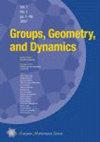可服从的组动作中的多命令
IF 0.8
3区 数学
Q3 MATHEMATICS
引用次数: 3
摘要
本文深入研究了多阶及其在可数可服从群测度保持作用中的应用。所谓可数群上的多阶,是指在$G$上的$\mathbb Z$型线性阶的集合$\widetilde{\mathcal O}$上的任意概率测度$\nu$,在$G$对这些阶的自然作用下是不变的。多阶存在于任何可数可调群上(且仅存在于这样的群上),并且每个多阶都具有Følner性质,这意味着几乎可以肯定,从单位开始的阶区间形成一个Følner序列。每个保持自由测度的$G$ -作用$(X,\mu,G)$都有一个多阶$(\widetilde{\mathcal O},\nu,G)$作为因子,并且与$\mathbb Z$ -作用$(X,\mu,S)$具有相同的轨道,其中$S$是由多阶因子确定的后继映射。此外,与多阶因子相关的次西格玛代数$\Sigma\_{\widetilde{\mathcal O}}$在$S$下是不变的,这使得对应的$\mathbb Z$ -作用$(\widetilde{\mathcal O},\nu,\widetilde{S})$成为$(X,\mu,S)$的因子。我们证明了由$X$的有限划分所产生的任意$G$ -过程的熵,以$\Sigma\_{\widetilde{\mathcal O}}$为条件,通过与$(X,\mu,S)$的轨道等价来保持。此外,这个熵可以根据所谓的随机过去,通过一个类似于$\mathbb Z$ -actions的$h(\mu,T,\mathcal P)=H(\mu,\mathcal P|\mathcal P^-)$公式来计算。然后将上述事实用于证明Rudolph和Weiss(2000)的结果的一个变体。最初的定理表明,可数可服从群的自由作用之间的轨道等价,只要“轨道变化”相对于$\Sigma$是可测量的,就保持了相对于次西格代数$\Sigma$的条件熵。在我们的变体中,我们用一个更简单的假设取代了可测量性假设:$\Sigma$在两个动作下都应该是不变的,并且结果因子上的动作应该是自由的。总之,我们提供了一个表征的Pinsker sigma代数的任何$G$ -过程在一个适当定义的远过去产生的多阶。在本文的附录中,我们给出了一个基于$G$的有序动态平铺系统的特别规则(一致Følner)多阶的显式构造。本文章由计算机程序翻译,如有差异,请以英文原文为准。
Multiorders in amenable group actions
The paper offers a thorough study of multiorders and their applications to measure-preserving actions of countable amenable groups. By a multiorder on a countable group, we mean any probability measure $\nu$ on the collection $\widetilde{\mathcal O}$ of linear orders of type $\mathbb Z$ on $G$, invariant under the natural action of $G$ on such orders. Multiorders exist on any countable amenable group (and only on such groups) and every multiorder has the Følner property, meaning that almost surely the order intervals starting at the unit form a Følner sequence. Every free measure-preserving $G$-action $(X,\mu,G)$ has a multiorder $(\widetilde{\mathcal O},\nu,G)$ as a factor and has the same orbits as the $\mathbb Z$-action $(X,\mu,S)$, where $S$ is the successor map determined by the multiorder factor. Moreover, the sub-sigma-algebra $\Sigma\_{\widetilde{\mathcal O}}$ associated with the multiorder factor is invariant under $S$, which makes the corresponding $\mathbb Z$-action $(\widetilde{\mathcal O},\nu,\widetilde{S})$ a factor of $(X,\mu,S)$. We prove that the entropy of any $G$-process generated by a finite partition of $X$, conditional with respect to $\Sigma\_{\widetilde{\mathcal O}}$, is preserved by the orbit equivalence with $(X,\mu,S)$. Furthermore, this entropy can be computed in terms of the so-called random past, by a formula analogous to $h(\mu,T,\mathcal P)=H(\mu,\mathcal P|\mathcal P^-)$ known for $\mathbb Z$-actions. The above fact is then applied to prove a variant of a result by Rudolph and Weiss (2000). The original theorem states that orbit equivalence between free actions of countable amenable groups preserves conditional entropy with respect to a sub-sigma-algebra $\Sigma$, as soon as the “orbit change” is measurable with respect to $\Sigma$. In our variant, we replace the measurability assumption by a simpler one: $\Sigma$ should be invariant under both actions and the actions on the resulting factor should be free. In conclusion, we provide a characterization of the Pinsker sigma-algebra of any $G$-process in terms of an appropriately defined remote past arising from a multiorder. The paper has an appendix in which we present an explicit construction of a particularly regular (uniformly Følner) multiorder based on an ordered dynamical tiling system of $G$.
求助全文
通过发布文献求助,成功后即可免费获取论文全文。
去求助
来源期刊
CiteScore
1.10
自引率
0.00%
发文量
45
审稿时长
>12 weeks
期刊介绍:
Groups, Geometry, and Dynamics is devoted to publication of research articles that focus on groups or group actions as well as articles in other areas of mathematics in which groups or group actions are used as a main tool. The journal covers all topics of modern group theory with preference given to geometric, asymptotic and combinatorial group theory, dynamics of group actions, probabilistic and analytical methods, interaction with ergodic theory and operator algebras, and other related fields.
Topics covered include:
geometric group theory;
asymptotic group theory;
combinatorial group theory;
probabilities on groups;
computational aspects and complexity;
harmonic and functional analysis on groups, free probability;
ergodic theory of group actions;
cohomology of groups and exotic cohomologies;
groups and low-dimensional topology;
group actions on trees, buildings, rooted trees.

 求助内容:
求助内容: 应助结果提醒方式:
应助结果提醒方式:


